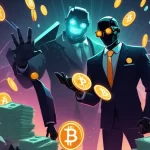SEC Plans Crypto ETF Overhaul: Solana and Altcoins Eye 2025 Approvals

SEC Set to Streamline Crypto ETF Approvals: Solana and Altcoins in the Spotlight for 2025
The U.S. Securities and Exchange Commission (SEC) is reportedly gearing up for a significant overhaul of its exchange-traded fund (ETF) approval process, with a sharp focus on cryptocurrency products. Whispers on social media platform X and industry insights point to a push for generic listing standards that could slash bureaucratic red tape for token-based ETFs. This comes alongside soaring optimism for altcoin ETFs like Solana, with approval odds topping 90% by the end of 2025, and a landmark approval for Grayscale’s Digital Large Cap Fund as a spot ETF—potentially signaling a regulatory thaw for crypto investments.
- SEC exploring generic listing standards to fast-track crypto ETF approvals.
- Solana ETFs boast 95% approval likelihood by 2025, per Bloomberg analysts.
- Grayscale’s diversified crypto fund approval hints at broader regulatory acceptance.
Decoding the SEC’s Streamlined Approach
For too long, the SEC has been the slow-moving gatekeeper of crypto innovation, bogging down ETF approvals with endless concerns over market manipulation, investor safety, and token classifications. The result? A backlog of filings and frustrated issuers stuck in regulatory purgatory. But change might be on the horizon. According to reporter Eleanor Terrett on X, the SEC is mulling over a streamlined ETF approval process. This could allow issuers to dodge the grueling 19b-4 process—a lengthy filing that demands detailed scrutiny of an ETF’s structure and exchange rules—and instead file a simpler S-1 form, a registration statement for new securities. If criteria are met, they’d wait just 75 days before listing on an exchange. As Terrett noted:
“The thinking, I’m told, is that if a token meets the criteria, issuers could skip the 19b-4 process, file an S-1, wait 75 days, and the exchange could list it.”
While the exact benchmarks remain under wraps, industry chatter points to factors like market capitalization, trading volume, and liquidity as likely qualifiers, as discussed in recent updates on SEC listing standards. For the unversed, ETFs are investment funds traded on stock exchanges, letting everyday investors dip into assets like cryptocurrencies without directly owning them—think of it as buying a slice of a crypto pie instead of baking the whole thing yourself. Token-based ETFs would track specific digital assets or bundles of them, bridging traditional finance with the chaotic brilliance of blockchain tech. If this streamlining pans out, it could be a game-changer for firms itching to launch products, cutting both time and cost in a space that moves at lightning speed.
Solana and Altcoin ETFs: The Hot Contenders
Among the most anticipated beneficiaries of this potential shift are altcoin ETFs, with Solana leading the pack. Nine Solana-based ETF filings are currently pending before the SEC, submitted by heavyweights like VanEck, 21Shares, Bitwise Asset Management, and Canary Capital. Solana’s appeal lies in its blockchain’s design—think of it as a super-fast highway for digital transactions, boasting low-cost, high-speed processing compared to Bitcoin’s more secure but slower road. It’s a darling for decentralized applications (dApps) and NFT markets, filling niches Bitcoin doesn’t touch. But it’s not without baggage. Past network outages during peak usage have raised eyebrows, and legal battles involving exchanges like Coinbase and Kraken have questioned whether Solana is an unregistered security. Could these hiccups spook the SEC, as debated in various discussions on Solana ETF challenges?
Despite the drama, optimism is sky-high. Bloomberg analysts Eric Balchunas and James Seyffart have pegged approval odds for Solana ETFs at an impressive 95% by the end of 2025, with key decision dates looming on October 10, 2025, as detailed in recent Bloomberg analysis on Solana ETF odds. Other altcoins aren’t far behind—XRP and Litecoin also sit at 95%, while Dogecoin, Cardano, Polkadot, Hedera, and Avalanche hover around 90%. Niche players like Sui are at 60%, and Tron lags at 50%. These odds aren’t pulled from thin air; they’re based on the SEC’s active dialogue with issuers, a playbook mirroring Bitcoin and Ethereum ETF approvals, and hints that many altcoins are being treated as commodities rather than securities. Still, let’s keep the champagne on ice—deadlines stretch into 2026 for some, and regulatory flip-flops are the SEC’s signature move, as explored in community insights on Solana ETF approval processes.
Grayscale’s Milestone: A Diversified Crypto Breakthrough
While single-asset ETFs like Solana’s grab headlines, the SEC’s recent approval of Grayscale’s Digital Large Cap Fund (GDLC) conversion to a spot ETF—listed on NYSE Arca as of early July—shows they might be playing it safe with diversified funds. Previously a private vehicle managing over $760 million, GDLC is now open to a wider investor base. Its portfolio is a crypto smorgasbord: roughly 80% Bitcoin, 11% Ethereum, 5-6% Ripple (XRP), 2-3% Solana, and about 1% Cardano. Why should you care? Because it’s a ticket to regulated crypto exposure without the headaches of wallet hacks or dodgy exchanges, as highlighted in recent updates on Grayscale’s ETF.
This isn’t just a win for Grayscale—it’s a signal. The SEC seems more comfortable spreading risk across multiple assets, using funds like GDLC as a low-risk sandbox to test regulatory frameworks. Analysts like Nate Geraci from ETF Store suggest this approval lets the SEC gather surveillance data via NYSE Arca’s capabilities before greenlighting standalone altcoin ETFs. It’s pragmatic, but it raises a question: are diversified funds the future, or do they dilute the push for blockchain-specific adoption? And with other basket ETFs in the pipeline—Bitwise’s $1.3 billion fund, Hashdex’s Nasdaq Crypto Index US ETF expansion, and Franklin Templeton’s filing—the trend toward broader crypto products is undeniable, as covered in news on Grayscale’s diversified portfolio approval.
Promises and Pitfalls of a Regulatory Pivot
As a Bitcoin maximalist at heart, I’ll admit I’m torn. Bitcoin is the undisputed king—digital gold, battle-tested, and the backbone of decentralized money. Altcoins? They’re flashy, sure, but often unproven. Yet I can’t deny their role. Ethereum powers smart contracts and DeFi, Solana turbocharges transaction speed, and even XRP has its cross-border payment niche. Regulated ETFs for these assets could funnel billions into the ecosystem—Bitcoin and Ethereum ETFs have already seen an estimated $6 billion influx since launch. That’s the dream of effective accelerationism (e/acc): a turbo boost for crypto’s disruption of traditional finance, smashing the status quo at warp speed, with potential impacts on altcoin investments.
But let’s cut the rose-tinted nonsense. The SEC’s history of playing whack-a-mole with crypto rules is infuriating. Streamlining sounds sexy, but what if the criteria are so strict only a few tokens make the cut? Or worse, what if it’s just more red tape disguised as progress? The agency itself admits its current system is a mess, tweeting:
“The outcome of our rules is not effective when companies require highly specialized lawyers and compensation consultants to prepare disclosure that the reasonable investor struggles to understand.”
Translation: even they know it’s broken. Will this overhaul deliver, or are we in for more chaos? Market integrity is another sticking point—while NYSE Arca’s surveillance capabilities got a nod for GDLC, can they really police fraud in a space as volatile as crypto? And let’s not ignore the investor risk. A flood of institutional cash is great until uninformed retail traders get rekt by wild swings or, worse, scammy projects riding the ETF hype wave. No bullshit here: adoption is the goal, but not at the expense of due diligence. Shameless price predictions and shilling have zero place in this space—research the fundamentals yourself, folks, and understand the basics of cryptocurrency ETF regulations.
Key Questions and Takeaways on Crypto ETFs
- What’s behind the SEC’s push to streamline ETF approvals?
They’re considering generic listing standards for token-based ETFs, potentially letting issuers skip the complex 19b-4 process, file an S-1, and list in 75 days if criteria like market cap and liquidity are met—cutting down on bureaucratic delays. - Why is Solana a frontrunner for ETF approval?
With nine filings pending and a 95% approval likelihood by October 2025, Solana’s fast, low-cost blockchain makes it a standout for dApps and NFTs, despite past downtime and legal questions over its security status. - How does Grayscale’s ETF approval shift the landscape?
It proves the SEC is warming to diversified crypto funds, offering regulated exposure to Bitcoin, Ethereum, Solana, and more, possibly as a testbed before standalone altcoin ETFs get the green light. - Can we trust the SEC to balance innovation and oversight?
Skepticism is warranted—their track record of inconsistency means we must watch the fine print for loopholes or overreach, even if the intent to simplify looks promising. - Do altcoin ETFs challenge Bitcoin’s dominance?
Not directly—Bitcoin remains the cornerstone of decentralized value, but altcoin ETFs could boost overall adoption by showcasing unique blockchain use cases, amplifying the financial revolution without dethroning the king.
Looking Ahead: Opportunity Meets Uncertainty
The SEC’s potential pivot on crypto ETF approvals is a beacon for integrating digital assets into mainstream markets, but the devil’s in the details—criteria, timelines, and regulatory rigor will make or break this moment. For now, we’re rooting for a framework that fuels innovation without sacrificing investor safety. This isn’t just about ETFs; it’s about whether crypto can storm the financial bastions while keeping its rebellious soul intact. We’ll keep slicing through the hype to deliver the raw, unfiltered reality of this regulatory clash with blockchain’s unstoppable march.



